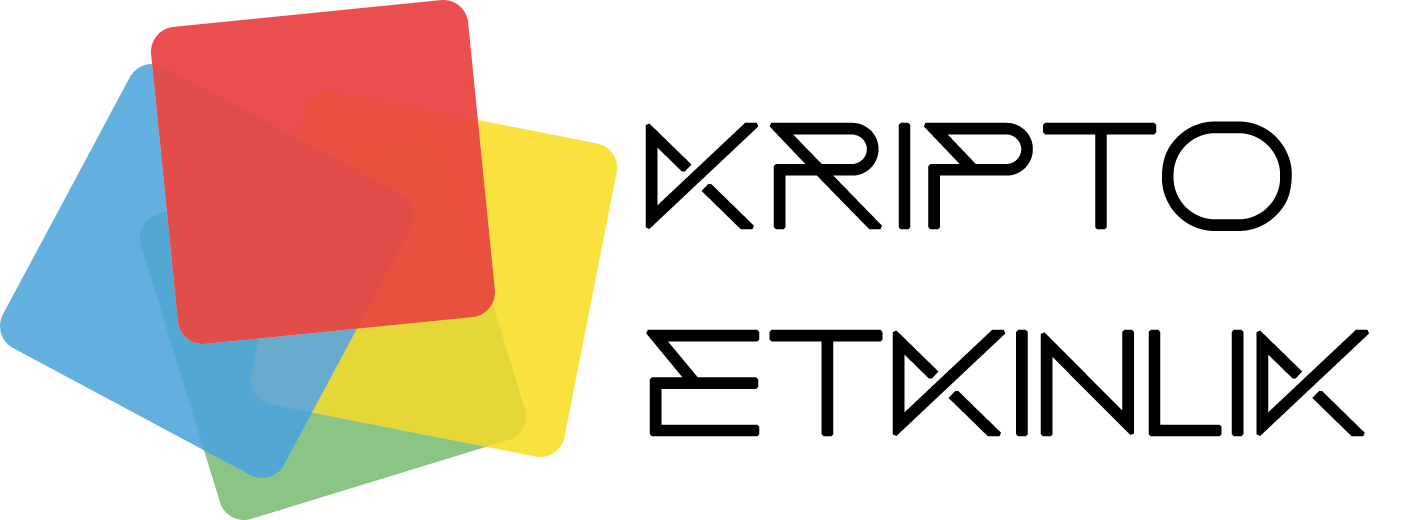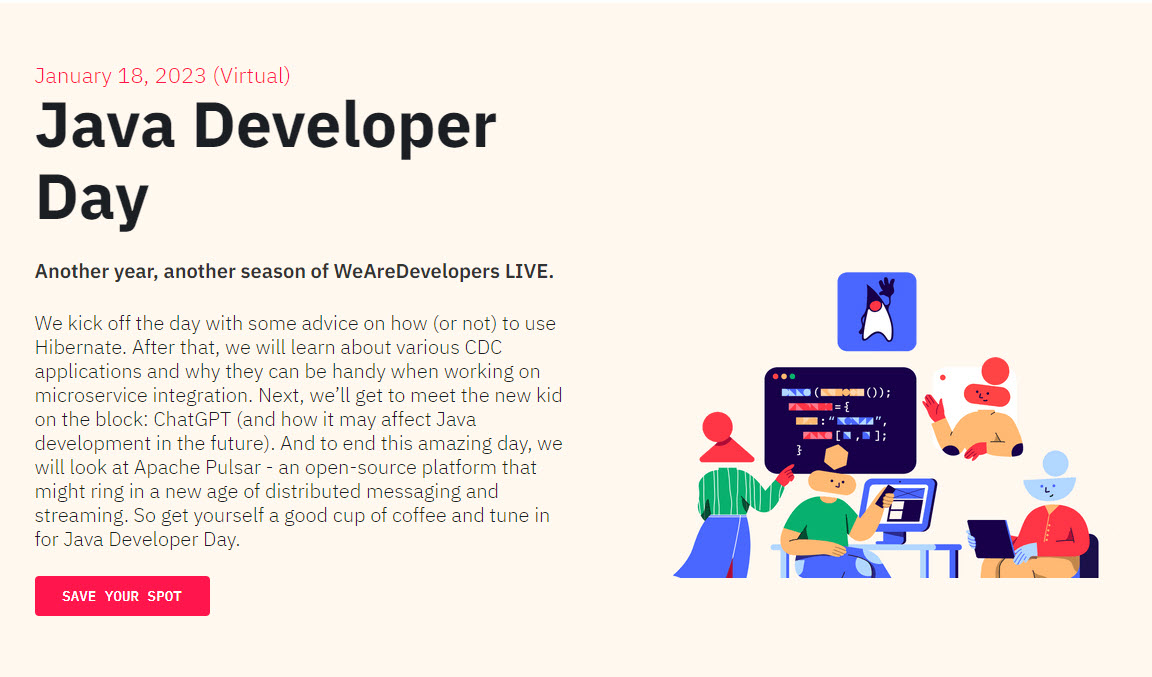Etkinlik Açıklaması
wearedevelopers Click
Another year, another season of WeAreDevelopers LIVE.
We kick off the day with some advice on how (or not) to use Hibernate. After that, we will learn about various CDC applications and why they can be handy when working on microservice integration. Next, we’ll get to meet the new kid on the block: ChatGPT (and how it may affect Java development in the future). And to end this amazing day, we will look at Apache Pulsar - an open-source platform that might ring in a new age of distributed messaging and streaming. So get yourself a good cup of coffee and tune in for Java Developer Day.
Explore the sessions and speakers

Being one of the most popular persistence frameworks for Java, Hibernate provides easy-to-use, object-oriented access to relational databases, enabling developers to focus on business logic rather than writing tons of JDBC statements. While this easy-to-use approach allows rapid application development, it comes with its own pitfalls. We are using Hibernate in all of our Spring Boot projects in a variety of scenarios, from classic web applications to long-running batch processes. On the way we made design decisions we regret now, discovered cool features, and found out a lot about how (and how not to) use Hibernate. In the following session, we will give a brief introduction to Hibernate and discuss some of our learnings.
About the speaker(s)
Philipp: Public Employment Service (AMS), e.g., on one of Austria's biggest job platforms. Before joining the Austrian Federal Computing Centre in October 2020, he was a project assistant at TU Wien, contributing to research on blockchain interoperability. For almost six years, Philipp developed enterprise software for insurance. In 2018, he received a master’s degree in software engineering and Internet computing from TU Wien. Gregor Lucny is a Lead Developer at the Austrian Federal Computing Centre and is currently working on projects for the Austrian Public Employment Service (AMS). Gregor joined the Austrian Federal Computing Centre right after his high-school graduation as a Junior Developer. In the last more than 15 years, he developed his career at the company, gradually taking more responsibility for a strategic project for clients in Austria’s public sector. In the meantime, he earned a Bachelor’s and a Master’s degree in Software Engineering from TU Wien.

Apache Kafka is a highly popular option for asynchronous event propagation between microservices. Things get challenging though when adding a service’s database to the picture: How can you avoid inconsistencies between Kafka and the database? Enter change data capture (CDC) and Debezium. By capturing changes from the log files of the database, Debezium gives you both reliable and consistent inter-service messaging via Kafka and instant read-your-own-write semantics for services themselves. In this session you’ll see how to leverage CDC for reliable microservices integration, e.g. using the outbox pattern, as well as many other CDC applications, such as maintaining audit logs, automatically keeping your full-text search index in sync, and driving streaming queries. We’ll also discuss practical matters, e.g. HA set-ups, best practices for running Debezium in production on and off Kubernetes, and the many use cases enabled by Kafka Connect’s single message transformations.
About the speaker(s)
Alex Soto is a Director of Developer Experience at Red Hat. He is passionate about the Java world, and software automation and he believes in the open-source software model. Alex is the co-author of Testing Java Microservices, Quarkus Cookbook, Kubernetes Secrets Management, and GitOps Cookbook books, and a contributor to several open-source projects. A Java Champion since 2017, he is also an international speaker, radio collaborator at Onda Cero, and teacher at Salle URL University. You can follow him on Twitter (@alexsotob) to stay tuned to what’s going on in Kubernetes and Java world.

Are you a Java developer looking for ways to optimize your workflows and increase productivity? Let’s talk about * Benefits of using ChatGPT * Limitations of using ChatGPT * Who can benefit the most from using ChatGPT Join us to learn more about ChatGPT and its potential impact on Java development!
About the speaker(s)
As a Technical Architect, Jakov is always looking for ways to improve and excel in his work. He has a strong background in performance tuning, coding, mentoring and is skilled at tackling large projects in areas such as SAP Commerce Cloud and Microservices. In his free time, Jakov can be found immersing himself in a good book or finding peace and relaxation in sports and nature.

The world is moving at an unprecedented pace and much of it has been powered by innovations in software and systems. In the case of streaming which very often leverages the underlying messaging mechanism(s) to bring distributed messaging to higher forms of purposes, an event streaming platform has indeed become the “glue” in enabling data to flow through disparate systems in the pipeline and in a very dynamic fashion. This talk on event streaming is meant for anyone interested in learning about it, and understanding how it fits into modern software development design and architecture, as well as seeing some of the challenges it faces especially in the Cloud Native environment. We’ll then take a look at an open-source platform - Apache Pulsar, which is poised to become the de facto new generation of distributed messaging and streaming platform that will bring joy to developers, and enable systems and applications to be highly responsive with its true real-time capabilities.
About the speaker(s)
Mary is a Java Champion and a passionate Senior Developer Advocate at DataStax, a leading data management company that champions Open Source software and specializes in Big Data, DB-as-a-service, Streaming, and Cloud-Native systems. She spent 3.5 years as a very effective advocate at IBM, focusing on Java, Jakarta EE, OpenJ9, Open Source, Cloud, and Distributed Systems. She transitioned from Unix/C to Java around 2000 and has never looked back since then. She is an active tech community builder outside of her day job and is currently the President of the Chicago Java Users Group (CJUG).

Pre-Recorded Session: Spring Framework 6 and Spring Boot 3 are almost here and you know what that means? New .jars! And also new baselines and new possibilities! Spring Framework implies a Java 17 and Jakarta EE baseline and offers new support for building GraalVM-native images. It also offers a new observability layer, an amalgamation of some of the work in the Micrometer project and Spring Cloud Sleuth. Spring Boot 3 builds upon all of this and integrates all of this into our application. Join me, Spring Developer Advocate Josh Long (@starbuxman), and we'll look at next-gen Spring.
About the speaker(s)
Josh (@starbuxman) is the Spring Developer Advocate at Pivotal. Josh is a Java Champion, author of 5 books (including O'Reilly's upcoming Cloud Native Java: Designing Resilient Systems with Spring Boot, Spring Cloud, and Cloud Foundry) and 3 best-selling video trainings (including Building Microservices with Spring Boot Livelessons with Spring Boot co-founder Phil Webb), and an open-source contributor (Spring Boot, Spring Integration, Spring Cloud, Activiti and Vaadin). He is a huge Kotlin-fan, too.

